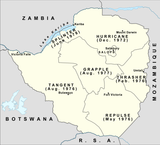Anonymous
9/4/2025, 12:33:05 PM
No.17973911
>>17973975
>>17973992
>>17974203
>>17974250
>>17974269
>>17974399
>>17974512
>>17977772
>>17978407
Did Rhodesia lose?
So I read up on the Rhodesian Bush War thanks to a post here claiming they were on the verge of winning, and I learned there were a lot of misconceptions. It feels like the opposite.
>By the early 1970s, Rhodesia went from tightly controlling all its frontiers from most infiltrations to having successful infiltrations everywhere
>Infiltrations would only get worse and never stop
>Most of the "splendid operations" they were responsible for mostly killed civilians and the top infamous one had to use other blacks. None had any effect on guerrilla operations
>Search and destroy was a failure
>Hearts and minds was a failure
>Chem and biological weapon deployment, one of the most desperate things a country can do in war was a failure and did not hamper guerrilla manpower
>Rhodesia's army was becoming more incompetent, inept and useless against African guerrillas over time
>Cracks in Rhodesia's deterrence strategy split when Botswana, formerly neutral, begun to openly aid rebels materially without fear of retaliation
>Rhodesia's failure to halt infiltration had gotten so bad that by the late 70s nearly its entire white population fled and all rural areas had the presence or direct control of guerrillas.
>Rhodesia lost its main petrol production plant thanks to a ZANLA strike near the end of the war, severely damaging its logistics. Commandos were infiltrating without issue, which would've been inconceivable in 1975
>Infiltrations and operations by guerrillas had eventually gotten so successful inside Rhodesia that a shift to a conventional war was being actively discussed and planned by insurgent high command. One could only imagine how this would go, but this even being discussed shows just how well things were going for the African fronts.
>Eventually, Rhodesia was forced to the diplomatic table thanks to the developments against them and surrendered to majority rule.
This makes it very difficult to believe Rhodesia won
>By the early 1970s, Rhodesia went from tightly controlling all its frontiers from most infiltrations to having successful infiltrations everywhere
>Infiltrations would only get worse and never stop
>Most of the "splendid operations" they were responsible for mostly killed civilians and the top infamous one had to use other blacks. None had any effect on guerrilla operations
>Search and destroy was a failure
>Hearts and minds was a failure
>Chem and biological weapon deployment, one of the most desperate things a country can do in war was a failure and did not hamper guerrilla manpower
>Rhodesia's army was becoming more incompetent, inept and useless against African guerrillas over time
>Cracks in Rhodesia's deterrence strategy split when Botswana, formerly neutral, begun to openly aid rebels materially without fear of retaliation
>Rhodesia's failure to halt infiltration had gotten so bad that by the late 70s nearly its entire white population fled and all rural areas had the presence or direct control of guerrillas.
>Rhodesia lost its main petrol production plant thanks to a ZANLA strike near the end of the war, severely damaging its logistics. Commandos were infiltrating without issue, which would've been inconceivable in 1975
>Infiltrations and operations by guerrillas had eventually gotten so successful inside Rhodesia that a shift to a conventional war was being actively discussed and planned by insurgent high command. One could only imagine how this would go, but this even being discussed shows just how well things were going for the African fronts.
>Eventually, Rhodesia was forced to the diplomatic table thanks to the developments against them and surrendered to majority rule.
This makes it very difficult to believe Rhodesia won




